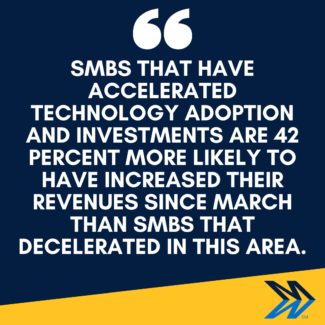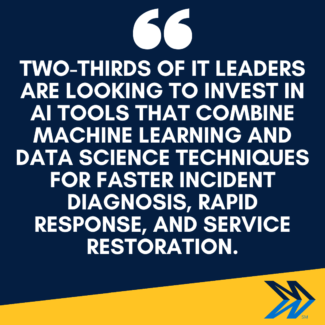February 18, 2021
The recent “Small & Medium Business Trends Report” released by Salesforce contains lots of actionable insights, but this particular detail is a bit surprising: “Only around one in four SMB leaders say the [COVID-19] pandemic has accelerated their investments in technology, with growing SMBs and medium-sized businesses significantly more likely than their respective counterparts to report acceleration in technology investments.”
The heading of that section? Digital-Forward SMBs Are Better Equipped to Handle Market Volatility.
 If that’s the case, though, it goes to reason that all SMBs should increase their tech investments. And while it’s true that many are now struggling financially, doing so seems like a no-lose move for those with the financial wherewithal. A late-2020 study by SMB Group backs that up, finding that “SMBs that have accelerated technology adoption and investments are 42 percent more likely to have increased their revenues since March than SMBs that decelerated in this area.” Granted, the same might not hold true now, during a once-in-a-century pandemic, but this too shall pass. That’s why planning for the future is paramount. Forward-looking companies know this and have shifted their tech priorities accordingly. Here are some examples of how.
If that’s the case, though, it goes to reason that all SMBs should increase their tech investments. And while it’s true that many are now struggling financially, doing so seems like a no-lose move for those with the financial wherewithal. A late-2020 study by SMB Group backs that up, finding that “SMBs that have accelerated technology adoption and investments are 42 percent more likely to have increased their revenues since March than SMBs that decelerated in this area.” Granted, the same might not hold true now, during a once-in-a-century pandemic, but this too shall pass. That’s why planning for the future is paramount. Forward-looking companies know this and have shifted their tech priorities accordingly. Here are some examples of how.
Increased use of cloud computing
Only a couple of months into the COVID-19 pandemic — as remote work, healthcare, education, and commerce were ramping up to record levels — traffic for the cloud-based Microsoft Teams (part of its 365 suite) rose to more than 200 million participants and four billion meeting minutes. The company’s CEO, Satya Nadella, characterized that rapid growth as “two years’ worth of digital transformation in two months.’” Likewise, Cisco’s WebEx platform saw a massive usage spike — one that continued in the ensuing months. Recent Gartner research indicates that worldwide spending on cloud computing will increase by 18.4 percent in 2021 to $304.9 billion. Plenty of SMBs will no doubt contribute to that growth.
Greater adoption of SaaS models
SaaS (Software as a Service) was big before the pandemic. Now it’s indispensable as more companies and organizations migrate their operations to cloud-based software that handles everything from supply chain and marketing to human resources and finance. Here’s how a recent TechCrunch article encapsulated the situation: “One thing is clear: SaaS companies that have reported recent earnings have done well…There is a clear connection between the domestic economy’s rapid transition to the cloud and the earnings reports we are seeing — from infrastructure to software and services. The pandemic is forcing a big change to happen faster than we ever imagined.”
 Wider use of AI
Wider use of AI
A recent report by OpsRamp found that “two-thirds of IT leaders are looking to invest in AI tools that combine machine learning and data science techniques for faster incident diagnosis, rapid response, and service restoration.” Those at SMBs are no exception, and more of them are implementing AI-based solutions like IVAs (virtual assistants) to supplement human call center staffers and provide enhanced customer service. As Mindsight Principal Consultant Kleid Gjataj noted in an earlier post, “In today’s day and age, customers expect immediate answers to all of their questions. Most common questions can be answered immediately by chat bots and virtual assistants.”
Enhanced cybersecurity
Consulting and research firm Analysys Mason found that “93 percent of the SMBs that increased their use of cyber-security solutions in April/May 2020 (40% of all SMBs surveyed) plan to maintain this new level of use or increase it further once COVID-19-related restrictions are relaxed.” Why? The short answer is that more online-based business activity means more vulnerability to cyber-attacks that have ravaged companies (SMBs included) financially and reputationally in the last decade or so. The average cost is now more than $200,000 per incident. “Attackers are getting smarter, attacks are occurring faster, and incidents are becoming more complex,” Justin Fier, director of cyber-intelligence and analytics at cyber-defense firm Darktrace, told CNBC. “The latest cyberattacks speedily exploit vulnerabilities in computer networks — which [can be infected] like human immune systems, changing thousands of times per second — and can overtake even major networks in an hour and a half.” And now that vCISOs are widely available, it’s easier than ever to find an expert who’ll keep an eye on things so you can tend to other aspects of your business.
Of course, none of this stuff is free. And hiring full-time staffers to manage it is out of the question for many SMBs. Fortunately, there are plenty of managed services providers (like Mindsight) who’ll do it all at a fraction of the cost. So whatever your budget, there’s likely a solution. As the authors of that OpsRamp report (above) put it, “Digital products and services can help firms cope with an unprecedented slowdown, build a foundation of customer trust, and ensure customer loyalty when things get back to normal.”
About Mindsight
Mindsight, a Chicago IT services provider, is an extension of your team. Our culture is built on transparency and trust, and our team is made up of extraordinary people – the kinds of people you would hire. We have one of the largest expert-level engineering teams delivering the full spectrum of IT services and solutions, from cloud to infrastructure, collaboration to contact center. Our customers rely on our thought leadership, responsiveness, and dedication to solving their toughest technology challenges.
Contact us at GoMindsight.com.
About the Expert
Kleid Gjataj is a Principal Consultant at Mindsight, an IT Solutions and Consulting firm located in the Chicago area. With nearly 15 years of experience in both domestic and international consulting, Kleid has helped contact centers of all sizes to bridge the gap between business and technology. His extensive experience with IVR, ACD, screen pop, omnichannel, speech analytics, quality management, outbound dialer, and custom applications is grounded in understanding the critical value of the customer journey. Kleid earned his degree in Network and Communications Management and continues to focus on how contact center optimization helps businesses meet goals, increase efficiencies, and reduce costs.
 Wider use of AI
Wider use of AI